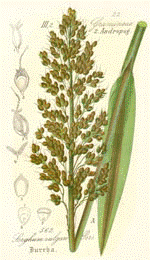International Sorghum and Millet Collaborative Research Support Program (INTSORMIL CRSP)

INTSORMIL Scientific Publications
Document Type
Article
Date of this Version
2009
Citation
USAID, INTSORMIL, 2009.
Abstract
Los ensayos uniformes de sorgo del PCCMCA, son el medio regionalizado para evaluar y seleccionar los mejores sorgos híbridos de las empresas de semillas y programas nacionales de la región. Esta información ha sido la base para que los agricultores reciban las mejores semillas que les aseguren buena cosecha y rentabilidad del cultivo.
En 2009 el ensayo se formó con un total de 6 híbridos de tres empresas y un testigo común. Los híbridos MSG 540, MSG 549 y MSG 551 de la empresa Monsanto; el híbrido 83P17 de la empresa Pioneer; los híbridos SR-340 y SR-450 de la empresa Prosemillas y el testigo común Ambar. El diseño utilizado fue de bloques completos al azar, con 4 repeticiones, la parcela experimental fue de 4 surcos de 5 m. de largo y 0.70 m. entre surco (14 m2); la parcela útil de 2 surcos de 4 m. de largo (5.6 m2). Los datos a tomar fueron, días al 50% de floración, altura de planta (cm), Rendimiento de grano (tm ha-1), largo de panoja (cm), aspecto de planta (escala 1-5), tolerancia a plagas y enfermedades (escala 1-5), donde 1=bueno y 5= malo. El ensayo fue sembrado en 9 localidades de Centroamérica, pero por efecto de sequía se perdió una localidad en Nicaragua por lo que este informe solo incluye datos de ocho localidades, con los que se realizó un análisis de varianza por localidad, un combinado por país, un combinado regional y un AMMI biplot de las 8 localidades. También se hizo un análisis químico para identificar el contenido de taninos del grano de cada híbrido.
En el análisis combinado a través de las 8 localidades los híbridos MSG 551 con 6.80 tm ha1, MSG 540 con 6.38 tm ha1 y SR-450 con 6.33 tm ha1, fueron superiores estadísticamente al resto de híbridos. Los híbridos MSG 551 y SR-450 presentaron la mejor estabilidad y buen rendimiento de grano. En el análisis químico de taninos, ningún híbrido presentó niveles altos perjudiciales a la salud de los animales. La localidad para evaluar la tolerancia de la enfermedad Mildiú Velloso (Peronosclerospora sorghi) se dio por perdida por no haberse presentado la enfermedad.
English:
The uniform trials of sorghum of the PCCMCA, are the way regional to evaluate and to select the best hybrid sorghums of the seed companies and national programs of the region. This information has been the base so that the farmers receive the best seeds that assure to them good harvest and profitability of the cultivation.
In 2009 the trial formed with a whole of 6 hybrids of three companies and a common check. The hybrids MSG 540, MSG 549 and MSG 551 of the Monsanto company; the hybrid 83P17 of the Pioneer company; the hybrids SR-340 and SR-450 of the Prosemillas company and Ambar as common check.
The used design was of randomating block, with 4 repetitions, the experimental plot was 4 rows 5 m. of length and 0.70 m. between row (14 m2); the useful plot of 2 rows 4 m. of length (5.6 m2). The information to take was, days to 50 % of flowering, plant height (cm), grain yield (kg ha 1), length of panicle (cm), plant aspect (scale 1-5), tolerance to pest and diseases (scale 1-5), where 1=good and 5 = poor.
The trial was sowed in 9 localities of Central America, but for drought effect a locality got lost in Nicaragua therefore this alone report includes information of eight localities, with which a variance analysis was realized by locality, a combined for country, a regional combined and an AMMI biplot of 8 localities. Also a chemical analysis was done to identify the content of tannins of the grain of every hybrid.
In the analysis combined across 8 localities the hybrids MSG 551 with 6.80 tm ha-1, MSG 540 with 6.38 tm ha-1 and SR-450 with 6.33 tm ha-1, were superior to the rest of hybrids. The hybrids MSG 551 and SR-450 presented the best stability and good grain yield. In the tannins chemical analysis, no hybrid presented high levels harmful to the health of the animals.
The locality to evaluate the tolerance of the Downy Mildew (Peronosclerospora sorghi) disease was considered lost because the disease had not appeared.


Comments
U.S. government publication. In Spanish with additional English title and summary.